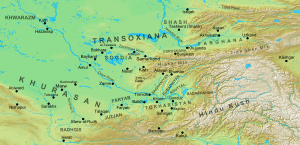Juday al-Kirmani
[1][2] His family belonged to the Azd 'Uman, and was closely allied to the Muhallabid clan, which was prominent in the Islamic East; Juday's father had fought under al-Muhallab ibn Abi Sufra in Kirman.With a contingent of 6,000 men, al-Kirmani blockaded the fortress of Tabushkhan, in Upper Tokharistan, where many of Ibn Surayj's supporters, including some of his relatives and his army's baggage train, had taken refuge.[4][5] During the subsequent campaign, Juday was named Asad's deputy and left in charge of the defence of Balkh,[6] which at the time was Khurasan's capital and the main base for the Arab military operations against the Türgesh.[15] Junayd was thus not confirmed in office, but replaced by Nasr ibn Sayyar, a veteran soldier from Khurasan whose own tribe was fairly unimportant, and thus deprived him of any independent power base.[19][20] That support was undermined during the civil war of the Third Fitna, during which the Qays–Yaman rivalry broke out into open fighting; the eventual victor, Marwan II, was a champion of the northern Arab Qays.[22][23][24] Agitation among the Yaman persisted, amidst rumours that Nasr had intercepted letters appointing al-Kirmani as governor, and a dispute on the payment of stipends to the Khurasani Arab militia (muqatila).With Marwan II still trying to consolidate his own position in Syria and Mesopotamia, Nasr was bereft of any hopes of reinforcement, and the allied armies of Ibn Surayj and al-Kirmani drove him out of Merv towards the end of 746.
Umayyad CaliphateKhurasanArabical-Harith ibn SurayjTürgeshNasr ibn SayyarYamaniAbbasid RevolutionJiruftKirmanAzd 'UmanMuhallabidal-Muhallab ibn Abi SufraAsad ibn Abdallah al-QasriUpper Tokharistanal-TabariOxus RiverTürgesh Khaganateheavily defeatedBattle of Kharistankhagangovernor of IraqYusuf ibn Umar al-ThaqafiHisham ibn Abd al-MalikDamascusThird FitnaQays–Yaman rivalryMarwan IIYazid IIIRabi'ahNishapurHashimiyyaAbu MuslimUmayyad dynastyAbbasid CaliphateBlankinship, Khalid YahyaGibb, H. A. R.The Royal Asiatic SocietyHawting, Gerald R.